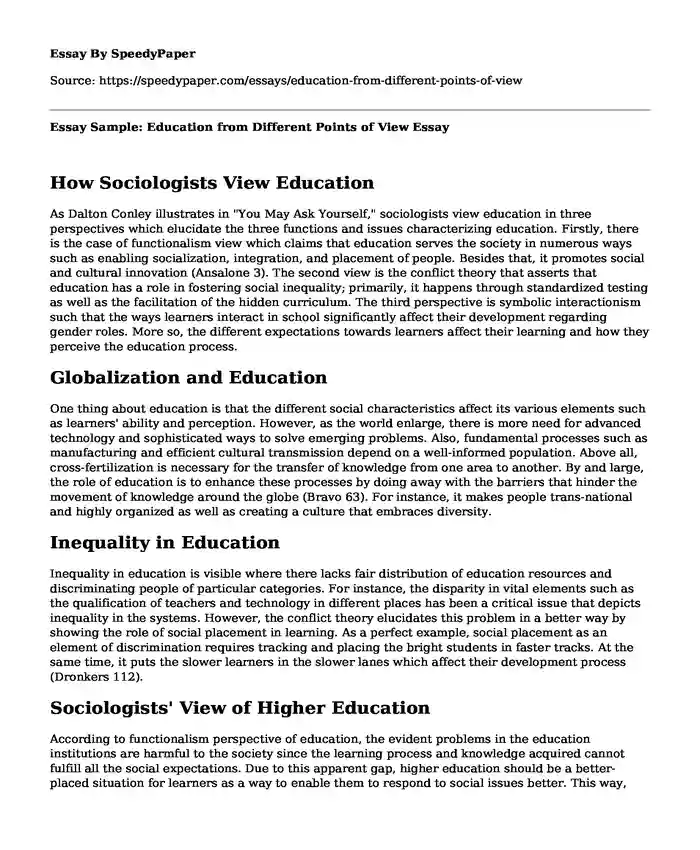
| Type of paper: | Essay |
| Categories: | Globalization Education Sociology |
| Pages: | 3 |
| Wordcount: | 680 words |
How Sociologists View Education
As Dalton Conley illustrates in "You May Ask Yourself," sociologists view education in three perspectives which elucidate the three functions and issues characterizing education. Firstly, there is the case of functionalism view which claims that education serves the society in numerous ways such as enabling socialization, integration, and placement of people. Besides that, it promotes social and cultural innovation (Ansalone 3). The second view is the conflict theory that asserts that education has a role in fostering social inequality; primarily, it happens through standardized testing as well as the facilitation of the hidden curriculum. The third perspective is symbolic interactionism such that the ways learners interact in school significantly affect their development regarding gender roles. More so, the different expectations towards learners affect their learning and how they perceive the education process.
Globalization and Education
One thing about education is that the different social characteristics affect its various elements such as learners' ability and perception. However, as the world enlarge, there is more need for advanced technology and sophisticated ways to solve emerging problems. Also, fundamental processes such as manufacturing and efficient cultural transmission depend on a well-informed population. Above all, cross-fertilization is necessary for the transfer of knowledge from one area to another. By and large, the role of education is to enhance these processes by doing away with the barriers that hinder the movement of knowledge around the globe (Bravo 63). For instance, it makes people trans-national and highly organized as well as creating a culture that embraces diversity.
Inequality in Education
Inequality in education is visible where there lacks fair distribution of education resources and discriminating people of particular categories. For instance, the disparity in vital elements such as the qualification of teachers and technology in different places has been a critical issue that depicts inequality in the systems. However, the conflict theory elucidates this problem in a better way by showing the role of social placement in learning. As a perfect example, social placement as an element of discrimination requires tracking and placing the bright students in faster tracks. At the same time, it puts the slower learners in the slower lanes which affect their development process (Dronkers 112).
Sociologists' View of Higher Education
According to functionalism perspective of education, the evident problems in the education institutions are harmful to the society since the learning process and knowledge acquired cannot fulfill all the social expectations. Due to this apparent gap, higher education should be a better-placed situation for learners as a way to enable them to respond to social issues better. This way, higher education should be more empowering as it helps in forming more stable and focused relationships and creating a more social innovative culture (Bravo 48-51). Therefore, the students' life becomes more advanced and receptive to the numerous changes that often bar a person from social and economic progress.
Impact of Market on Education
As students leave their different learning institutions, they have different expectations, and the society raises the bar for them as well. As they explore different areas, there is a tendency of the market to keep advancing the way it responds to social and economic needs hence the need for advanced skills. Due to such a critical requirement, it becomes crucial for the different segments of the education process to respond in equal measure. One benefit is that the students, particularly in higher learning, become skilled with what is useful in the present day's market (Bravo 77-78). However, such abrupt changes may be disadvantageous since it is highly unconvincing. Indeed, the need for change affects the learning styles and resources used in elementary and high schools as well.
Works Cited
Ansalone, George. "Tracking: Educational differentiation or defective strategy." Educational Research Quarterly 34.2 (2010): 3.
Bravo, David, Sankar Mukhopadhyay, and Petra E. Todd. "Effects of school reform on education and labor market performance: Evidence from Chile's universal voucher system." Quantitative Economics 1.1 (2010): 47-95.
Conley, Dalton. You May Ask Yourself: An Introduction to Thinking Like a Sociologist. New York ; London : W.W. Norton, 2017.
Dronkers, J. Quality and Inequality of Education: Cross-national Perspectives. Dordrecht: Springer, 2010.
Cite this page
Essay Sample: Education from Different Points of View. (2022, Mar 22). Retrieved from https://speedypaper.net/essays/education-from-different-points-of-view
Request Removal
If you are the original author of this essay and no longer wish to have it published on the SpeedyPaper website, please click below to request its removal:
- Essay Sample on the Nursing Code of Ethics
- Admission Essay Sample for Columbia University SIPA Masters in Public Administration
- Business Essay Example on KPMG Management Consulting
- Free Essay Describing Leadership Style and Skills
- The Current Immigration Policy, Free Essay for Students
- Free Essay Comprising Analysis of Pride and Prejudice by Jane Austen
- Paper Example: Probability of Obtaining Heads on a Coin Toss
Popular categories




